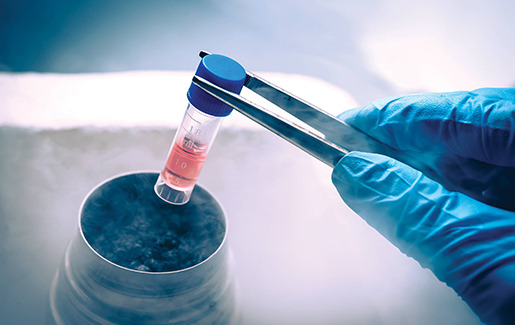Human embryos are grown within our state of the art labs and immediately frozen in liquid nitrogen for later use. At a future date, these embryos (referred to as frozen embryos) are thawed and then transferred to the female partner. The transfer of frozen embryos (is also called Frozen Embryo Transfer) increases the chances of a successful outcome.
Lets understand the details here
Are there specific scenarios where a frozen embryo transfer is recommended compared to a fresh transfer?
Yes, your clinician will suggest freezing embryos for later use. The process of deferring the embryo transfer allows the woman’s body to recover from the medications or injections given during IVF. This helps in creating an environment devoid of stress and more conducive to implantation. Other conditions include:
- You are unwell at the time of the egg retrieval process
- You have a fibroid or polyp in your uterine cavity (this interferes with embryo implantation)
- Your uterus lining is not strong enough to receive an embryo
- You are at risk of developing ovarian hyperstimulation syndrome (OHSS)
- You have experienced failed cycles from earlier fresh transfers
- You have extra good quality embryos that can be used in future attempts
How do we freeze the embryos?
After we fertilize the egg and sperm in our laboratory, we allow the embryo to grow for a few days.
We select the best quality embryos for freezing. We then place the embryo in a freezing solution that protects it from any environmental concerns. At IVF Access, we freeze the embryo using an advanced technique for rapid freezing through which it is quickly brought to sub-zero temperatures. The embryo is stored in liquid nitrogen until the clinician decides on the date for transfer
After how long can I have a frozen embryo transfer?
Most studies show that a frozen embryo can be kept for 10 years or more.
Is frozen embryo transfer better than fresh?
Certain scientific studies suggests that pregnancy rates with frozen embryo transfers are better than fresh embryo transfers for women older than 35 years of age. Our clinicians will take into account your current medical conditions, history and your age
How successful are frozen embryo transfers?
Frozen Embryo transfers have seen similar or higher pregnancy success rates than those with natural conception.
How should I prepare for my frozen Embryo Transfer?
- Follow the directions for your medications and review them in advance to ensure that you understand how to administer all your medications correctly
- Make sure you have enough medications, especially if you are traveling during your cycle
- Stress Reduction is key! Take a walk, stroll through your favourite parks, listen to music, and if you do exercise, a little bit of mediation, and yoga is beneficial
- Eat a balanced diet and include fresh vegetables, fruits (especially those rich in iron)


Leave a Reply